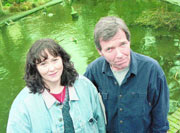SEATTLE VOTERS will either wince or congratulate themselves four years from now when they reflect upon mayoral campaign moments such as these: Last week at Whitman Middle School in Crown Heights, a student asked candidates Greg Nickels and Mark Sidran how they would use the mayor’s office to improve her education. Nickels replied like a doting uncle: The city is going to help your school maintain its facilities and see to it that you learn about the fascinating industry in this town. Sidran, on the other hand, played the grandma who’s baby-sat the kids one too many times: We’d start with an important lesson, he said, that there’s no free lunch. He added: “I wouldn’t tell you that I’d take care of your school’s facilities. That’s a stretch for a city already about to take over more parks.”
It’s easy to guess whom the PTSA warmed up to that night, and reasonable to predict that Nickels will win the votes he needs to become mayor on Nov. 6. Dogged for months by accusations that he isn’t a decisive leader, Nickels has compensated by throwing his arms wide as the provident paterfamilias. With labor, neighborhoods, and environmental groups solidly behind him, Nickels is in poll position and shows no signs of tempering his Pollyanna pitch—If it feels good, it can’t be wrong—even as harsh city budget cuts loom in the near future.
Nickels shows no signs that he’s concerned by charges that he can’t lead in hard times. Last week, when asked at a Rotary Club luncheon how he would trim the city budget, Nickels responded by emphasizing how much city revenues have grown in the past four years. He’s said we can both build light rail and expand the monorail. He’s promised information hotlines, bikeways, tow trucks stationed at accident-prone intersections, neighborhood projects, even increased east-west bus service!
If you ask his supporters whether in these anxious days, with the economy tanking and anthrax scares causing daily evacuations, Nickels should imitate Churchill more than Santa Claus, they respond that the present strategy is winning in the polls. They say Nickels’ core strengths—steadiness, consistency, and earnestness—are hitting home in Seattle. But couldn’t Nickels also be rowdy, aggressive, even colicky, just for a little while? If we needed him to be?
“Being nice doesn’t have to equate to being an ineffective leader, and I think people are smart in figuring that out,” says Nickels’ campaign consultant Don McDonough.
But others say Nickels’ perpetual salesmanship mode is a liability for both his campaign and the city. “He’s not the kind who’s going to give you a yes or no answer, he’s going to give you a political answer,” says Jay Sauceda, former aide to City Council member Charlie Chong, one of Nickels’ mayoral primary opponents. Nickels’ unwavering support for light rail, hailed by Nickels’ backers as evidence of his principled persistence, strikes Sauceda as another bill of goods. “It’s like he doesn’t want to give one square inch on it. If he would just make stronger statements about how it’s over budget—just something to show that he’s not going to drive us over the cliff dollarwise,” says Sauceda.
The only time Nickels has stepped out of the role of the nice guy promising lots of goodies was two weeks ago when, at a Nickels press conference, a black minister decried Sidran’s city attorney record for galvanizing the city’s racial relations. But when the daily newspapers hyped the minister’s comments, and their editorial pages went ballistic with charges of race baiting, Nickels’ campaign backed off the issue, saying the intent of the press conference was to showcase Nickels’ broad constituency, not portray Sidran as racially divisive.
King County Council member Larry Gossett, who is African American, says he doesn’t believe Nickels ever intended to play the race card and blames the daily press for blowing the minister’s comments out of proportion.
Consultants say they doubt Nickels will say anything more on the issue. So far, Nickels hasn’t, even though he’s also said he thinks it would be appropriate to.
In the last six months of campaigning, with Sidran showing a formidable ability to rouse voter sentiment against light rail and the homeless, and the country still bobbing in the wake of Sept. 11, Nickels’ campaign has stuck to its strategy, evolving only at a Darwinian pace. It’s gone all the way from “doing things the Seattle way” to “have it your way.”









